Some say it may have been fate that David Hasson ended up in the automotive industry. “I grew up in a small town, the most southern town in Canada,” he recalls about Kingsville, Ontario. “It was thirty miles south of Windsor, which itself is one mile south of Detroit. From about age fourteen on, I couldn’t wait to get a driver’s license, so I could get out of the town and go to a city occasionally. You grow up with a car niche in your DNA.”
Such close proximity to the Motor City—and the romanticism of automobiles that comes with it—would inform Hasson’s career. Even before he landed his current role as vice president of tax at BorgWarner—a global leader in clean and efficient technology solutions for combustion, hybrid, and electric vehicles—Hasson spent six years as the vice president of international tax planning and audits at TE Connectivity Ltd. (formerly Tyco Electronics Inc.). “Forty percent of its business was also in the auto industry,” Hasson explains. Similar to BorgWarner, Hasson says it sells to every major car maker on the planet. In other words, it would appear that cars and taxes are in his blood.
Nonetheless, those are just two examples of a variety of positions and general life experiences that Hasson has held over the years. True to his goal, he eventually left his small town and started living, working, and learning in everywhere from Toronto and Philadelphia to Chicago and Auburn Hills, Michigan, where BorgWarner is headquartered. The journey hasn’t always been a conventional one either. Surprisingly, there was a time when the realm of taxes was far from being his strong suit. Hasson recalls struggling with the subject while earning his bachelor of commerce from the University of Windsor. “The last exam I took in college was my tax exam,” he says. “It was the only C I got.” But he wasn’t deterred; quite the opposite, actually. “I decided to tackle something I feared, so I went into the tax world and became successful at it.”
After building up his adeptness with taxes, he received offers from four big accounting firms—PricewaterhouseCoopers (PwC), Deloitte Touche Tohmatsu, Ernst & Young, and KPMG—and ended up going with PwC, where he served as international tax manager from 1988 to 1991. The position gave him considerable skills in the international tax arena—skills that he supplemented by teaching classes for senior managers and partners on accounting and tax.
The self-taught education in worldliness would serve him well, especially from 1991 to 2000, when he accepted the position of manager of global tax and treasury at General Electric (GE). “On my first day, my boss—who was the CFO—said, ‘Did they tell you you’d be responsible for treasury?’ ” Hasson recalls. “I said, ‘Not really,’ and they said, ‘Well yeah, you are.’ And I said, ‘Well, I really don’t have a lot of experience.’ Then he said, ‘You’ll learn quickly.’ ”
One of Hasson’s major responsibilities was managing the company’s foreign currency exposure, a complicated task that involved creating a global billing system. Until then, GE’s three manufacturers—stationed in the United States, France, and Japan—had to charge their affiliates in dollars, francs (before the euro went into circulation), and yen, though the products were being distributed to countries all over the world. However, once Hasson’s system was in place, it gave the manufacturers the ability to bill in multiple currencies at once.
Although it was complex, Hasson looks back on the project as a trial by fire that gave him the tools needed for his current position at BorgWarner. When he was brought on in 2013 to fill the inaugural vice president of tax role, he was tasked with reshaping the department and improving its overall health. He purposely started his new job in early January 2013, which allowed him to observe the year-end close process and make an initial assessment of the tax team. Then came the interviews with every member of the department, thus giving him insight into what was working well and what could be improved. It’s an annual process that he enjoys to this day, and it has resulted in the incorporation of additional skills to his department needed to be successful and foster growth.
But Hasson recognizes that, in a way, his role at BorgWarner goes beyond finance as it has a direct effect on the development of the company’s environmentally friendly technologies. “I didn’t have an appreciation for the kind of products we made before I got here,” he says.
In fact, Hasson played a significant role in facilitating the $1.3 billion acquisition of Remy. The buyout took place in fall of 2015 and is already proving to be another leap forward in the company’s electric-motor development. The collaboration has also successfully integrated Remy’s expertise in electrical systems with BorgWarner’s industry-leading mechanical and manufacturing capabilities, creating a momentum behind an array of new electrified products.
The acquisition of Remy and emphasis on electrification has inspired Hasson to stay informed about all aspects of the company, not just the ones directly related to finance. Simply put, he believes it helps him do his job to the best of his ability. For instance, he often asks to sit in on board meetings that include product updates, though he’s not required.
As Hasson has proven, working in taxes isn’t just about finance; it can also be about facilitating innovations that help reduce vehicle emissions, even if he doesn’t think most people will be driving electric cars anytime soon. Then again, never say never. With minds like Hasson’s at the company, who knows what’s in store for the future?

